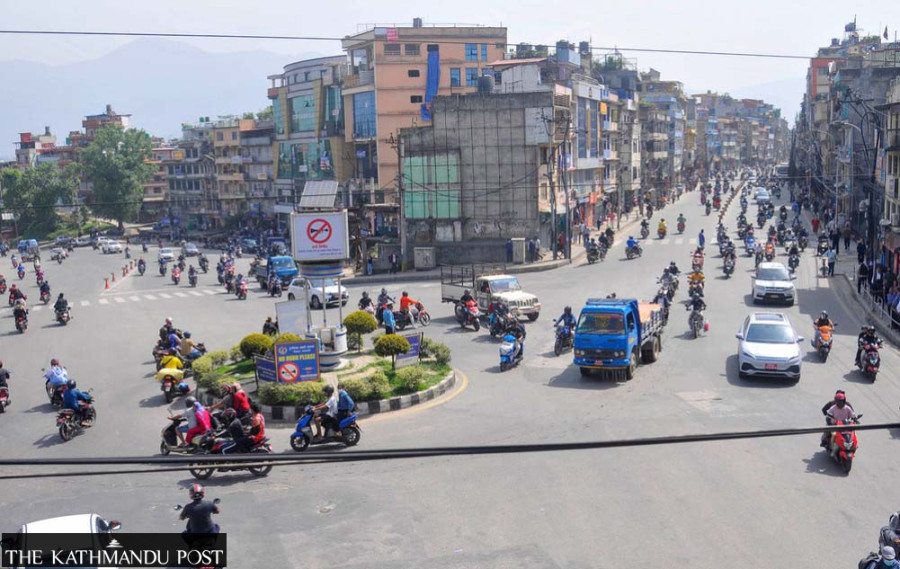National
Strike against ride-hailing hits commoners hard
But ride-hailing drivers cash in as commoners bear the brunt. Kathmandu urges suspension of disputed rules.
Purushottam Poudel
Karna Bahadur Karki, 73, and his sister, Krishna Kumari Adhikari, 60, residents of Butwal, arrived in Kathmandu on Saturday for a scheduled follow-up at a private hospital in Thapathali. However, they were caught off guard by the sudden transport strike.
When the Post met them on the hospital premises at around 2:30 pm, the brother and sister were unaware why the public vehicle operators enforced the strike.
“We came to Kathmandu for a regular follow-up and are staying at a relative’s place,” said Karki. “We struggled to reach the hospital this morning and are uncertain how we will return home.”
On Monday, a nationwide transport strike called by public transport operators left thousands of commuters stranded and caused hardships to patients, caregivers, and others travelling for various reasons.
The ‘central struggle committee’ of transport operators enforced the strike to “protect public transport”. The committee has called for an indefinite halt to public transport services in protest against a provincial government’s recent decision to formulate a policy to regulate ride-hailing and self-driving services.
The Gandaki province government recently implemented a regulation to legalise ride-hailing under a legal framework. Officials say the goal is to ensure the safety, insurance, and rights of service users while also enabling the government to collect taxes.
The Gandaki provincial government introduced the ride-hailing regulation-2025 on May 15 while Bagmati province is reviewing a draft regulation to bring the services under provincial oversight and taxation.
The move follows multiple directives from the Supreme Court urging the federal and provincial authorities to regulate ride-hailing and self-driving services. Immediately after the new regulations were published in the provincial gazette, the National Federation of Nepal Transport Entrepreneurs launched protests demanding that the rules be repealed.
Transport entrepreneurs particularly object to the provision allowing vehicles registered for private use to operate for hire or carry passengers. They claim that the rules introduced by the Gandaki provincial government violate the Federal Act, as Section 8 of the Motor Vehicle and Transport Management Act 1993 (Amended in 2018).
The provision defines a private motor vehicle as one that has the certificate of registration for private use. Section 8(2) states that no private motor vehicle shall be used for public transport.
Therefore, they argue, the provincial rules should be annulled.
When public transport workers went on strike to protest ride-hailing regulations, commuters bore the brunt of the disruption throughout Monday. Their hardship was compounded as ride-hailing drivers seized the moment to raise fares.
People had to bear additional cost also because ride-hailing service providers slapped extra charges, cashing in on the strike.
Sabita Gurung, 34, a Jorpati resident, regularly visits Paropakar Maternity and Women’s Hospital in Thapathali, where her mother-in-law is undergoing treatment for cervical cancer.
“We have been using ride-hailing services for convenience, but today the price was unusually high,” Gurung said. “We had no choice but to pay as there was no public transport.”
While some ride-hailing users reported increased fares, certain companies denied overcharging and cautioned users against offline rides, which are harder to monitor and regulate.
To tackle the strike’s impact, Sajha Yatayat, Nepal Police, and the Armed Police Force operated buses along some key routes in the Kathmandu Valley, providing some relief to commuters.
Amid the strike by public transport operators, the federal government on Monday has requested the Gandaki provincial government to temporarily halt the implementation of the disputed regulations.
According to the discussions held at the Ministry of Home Affairs on Monday, a consensus was reached wherein the federal government requested the province government not to immediately enforce the new ride-hailing rules.
A meeting at the ministry, attended by Home Minister Ramesh Lekhak, Chief Secretary Ek Narayan Aryal, and representatives from various other ministries, decided to form a committee to draft the points of agreement.
A talks team comprising representatives from the government and the agitating side has been formed under the coordination of Engineer Krishna Raj Pant, a joint secretary at the Ministry of Physical Infrastructure and Transport.
Meanwhile, the National Human Rights Commission (NHRC) has taken serious exception to the disruption of public transport.
Issuing a statement on Monday, the NHRC said that the shutdown of essential services such as public transport had affected thousands of people, including the elderly, patients seeking medical care, students, jobholders, and those taking the Teachers Service Commission examinations.
“While holding peaceful protests is a fundamental right in a democracy, any activity to seek one’s right must not infringe on the rights of others,” the commission said. “Disrupting essential services like public transport directly impacts citizens’ ability to enjoy their basic human rights.”
The NHRC noted that it had been monitoring reports published in the media and gathering information from stakeholders concerned. It confirmed that the shutdown had hampered the movement of citizens not only in Gandaki province, where the protest began on May 30, but also in the Kathmandu Valley and other parts of the country.
On Sunday and Monday, transport strikes led by public vehicle operators left roads empty in cities like Pokhara, Bharatpur, Janakpur, Bhairahawa, and Dhangadhi, with many travellers stranded without options. Halt of vehicular movement in the major towns crippled regular activities in adjoining districts as well.
In Lamjung and Kaski, even vehicles carrying tourists were blocked.
Also, the Nepal Association of Tour and Travel Agents (NATTA) issued a statement expressing concern over the disruption caused to the tourism sector.
“Tourism is the backbone of the country’s prosperity and has been severely affected by the ongoing strike,” the statement read. “We urge all stakeholders to come together and resolve the issue without further delay.”




 20.12°C Kathmandu
20.12°C Kathmandu















